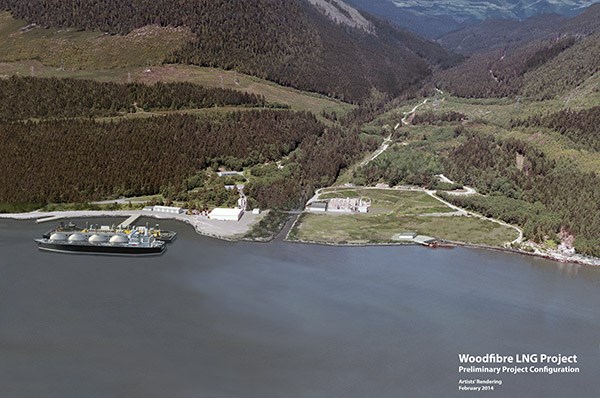B.C.’s liquefied natural gas (LNG) advocate last week defended the provincial government’s pursuit of LNG export opportunities against a charge that doing so would be no less greenhouse gas intensive than allowing Asian countries to power their industries with coal.
Gordon Wilson, the former B.C. Liberal leader who was one of three pro-LNG speakers at a Squamish Chamber of Commerce luncheon last Wednesday (March 26), said one of his jobs as “Buy B.C. Advocate” for LNG is “to make sure businesses and citizens understand the details and scope” of the opportunity that Premier Christy Clark’s government believe they should embrace.
He said he was encouraged that a number of local businesses have already signed up to attend a government-sponsored LNG conference and trade show planned in Vancouver May 21 to 23. Vicki Schenk, technology instructor at Howe Sound Secondary School, has also applied for and received permission for a group of local students to attend the conference.
Wilson said projects such as the LNG processing and export facility proposed on the site of the former Woodfibre pulp mill represent a huge opportunity for communities and the province as a whole.
While he expects other countries to compete against B.C. for a piece of the global LNG market, “Even if we only realize a fraction of the potential, it’ll be extremely beneficial.”
With Wilson, Spectra Energy official Greg Staple, and Fortis B.C.’s Joe Mazza as the three scheduled speakers at last week’s event, most of the discussion at the Timberwolf Restaurant and Lounge was decidedly pro-LNG.
Staple said that with recent developments in the technology of extracting natural gas underground rock formations, B.C.’s potential for new LNG production is “very significant.”
However, he said, “As it stands today, to take full advantage of the opportunity, you need to have access to new markets, and for that you need to look beyond North America.”
Squamish resident Tracey Saxby, though, demonstrated that not all British Columbians are sold on the idea of exporting B.C.’s natural gas to overseas markets.
After Saxby asked what would happen if B.C. decided not to export LNG, Mazza responded that some of the gas “would basically stay in the ground.”
Said Saxby, “That’s actually something I would advocate for.”
She said she’s concerned that with all the resources used in the practice of hydraulic fracturing, or “fracking,” as well as the processing and transport of the resource, exporting LNG to countries like China will be “no cleaner in terms of greenhouse gas emissions than coal.”
She asked Wilson whether the government had done a cost-benefit analysis on LNG export that includes the impacts on marine-based industries — she mentioned the oyster industry as one example — from climate change and the potential for environmental mishaps in B.C.’s coastal waters.
Wilson said he has no doubt that relatively clean natural gas can be a “transition fuel” for Asian economies trying to wean themselves off of coal.
“I say if we can have an industry that helps China convert from coal, I’m in,” Wilson said. “For us here in British Columbia to not respond to that, I think, is globally irresponsible.”
On the local front, Mazza said he thinks that if the 52-kilometre Fortis B.C. pipeline expansion from Coquitlam to Squamish goes ahead, it’ll generate around $1 million in new property taxes to jurisdictions along the route — about a third of that to District of Squamish.
Byng Giraud, Woodfibre Natural Gas vice-president, added that if the $1.7 billion Woodfibre facility goes ahead, its property tax contribution “is going to be bigger than that — substantially bigger.”
Giraud said that if it receives environmental certification, the LNG plant’s proponents aim to make a “soft” decision on whether to proceed by the end of 2014. That’s the point at which they would start ordering all the equipment for the project. The final investment decision, which would come from Singapore-based parent firm Pacific Oil and Gas, is expected in the first half of 2015, he said.
Also last week, West Vancouver-Sea to Sky MLA Jordan Sturdy proclaimed his support for the Woodfibre LNG project in the legislature.
“We’re supporting this tremendous opportunity for growth with actions, which ensure British Columbians are equipped with the skills necessary to secure new jobs,” Sturdy said in his statement.
A group of citizens that includes Saxby has partnered with Quest University to organize an event titled, “Boom or Bust? B.C.’s LNG Legacy,” on Tuesday (April 8) at 6:30 p.m. at Quest. Speakers include Marc Lee, senior economist with Canadian Centre for Policy Alternatives, Jeremy Moorhouse, senior analyst with Clean Energy Canada and Matt Horne of the Pembina Institute. To register, visit Boomorbust.eventbrite.ca.
— With files from Glacier Media.



